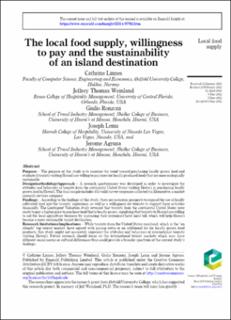| dc.contributor.author | Linnes, Cathrine | |
| dc.contributor.author | Weinland, Jeffrey Thomas | |
| dc.contributor.author | Ronzoni, Giulio | |
| dc.contributor.author | Lema, Joseph | |
| dc.contributor.author | Agrusa, Jerome | |
| dc.date.accessioned | 2022-10-26T11:18:17Z | |
| dc.date.available | 2022-10-26T11:18:17Z | |
| dc.date.created | 2022-08-08T20:41:19Z | |
| dc.date.issued | 2022 | |
| dc.identifier.citation | Journal of Hospitality and Tourism Insights. 2022. | en_US |
| dc.identifier.issn | 2514-9792 | |
| dc.identifier.uri | https://hdl.handle.net/11250/3028412 | |
| dc.description.abstract | Purpose - The purpose of this study is to examine the trend towards purchasing locally grown food and evaluate if tourists to Hawai´i are willing to pay more for locally source foods which are more ecologically sustainable. Design - This research questionnaire investigates the attitudes and behaviors of tourists from the continental United States visiting Hawai’i. The final sample includes 454 valid survey responses that were collected via Momentive, a market research services company. Findings - The results of this study determined that there are economic opportunities to further integrate sustainable food consumption and production into the experience of tourist’s and there is a willingness to support these activities financially from the tourist. The Contingent Valuation study revealed that tourists from the continental United States were willing to pay an additional cost to encourage the use of sustainable tourism goods in Hawai'i, including paying more for locally grown food, indicating that they would be willing to increase their restaurant/hotel food bill in order to support Hawai‘i´s local farming industry. Research limitations/implications – While tourists from the United States mainland, which are the Hawaiian islands’ top tourist market have agreed with paying more for locally grown food products, this study might not accurately represent the attitudes and behaviors of international tourists. Future research should focus on international tourist markets with a variety of economic, social, and geographical settings to broaden the generalizability of the current study's findings. Originality/Value - This study addresses a gap in the tourism research literature by giving quantitative evidence of United States visitors' interest in purchasing locally grown food items as well as their willingness to pay an additional fee for locally grown food products at a restaurant or hotel. | en_US |
| dc.language.iso | eng | en_US |
| dc.publisher | Emerald | en_US |
| dc.rights | Navngivelse 4.0 Internasjonal | * |
| dc.rights.uri | http://creativecommons.org/licenses/by/4.0/deed.no | * |
| dc.subject | sustainable food consumption and production | en_US |
| dc.subject | consumer behavior | en_US |
| dc.subject | tourist perceptions | en_US |
| dc.subject | economic sustainability | en_US |
| dc.subject | willingness to pay | en_US |
| dc.subject | Hawai’i | en_US |
| dc.title | The local food supply, willingness to pay and the sustainability of an island destination | en_US |
| dc.type | Peer reviewed | en_US |
| dc.type | Journal article | en_US |
| dc.description.version | publishedVersion | en_US |
| dc.rights.holder | © Cathrine Linnes, Jeffrey Thomas Weinland, Giulio Ronzoni, Joseph Lema and Jerome Agrusa. | en_US |
| dc.subject.nsi | VDP::Samfunnsvitenskap: 200 | en_US |
| dc.source.journal | Journal of Hospitality and Tourism Insights | en_US |
| dc.identifier.doi | 10.1108/JHTI-01-2022-0031 | |
| dc.identifier.cristin | 2041847 | |
| cristin.ispublished | true | |
| cristin.fulltext | original | |
| cristin.qualitycode | 1 | |

